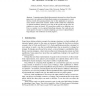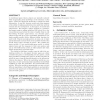904 search results - page 34 / 181 » Game Theory |
GLOBECOM
2006
IEEE
15 years 3 months ago
2006
IEEE
It is shown in this paper that direct extensions of distributed greedy Interference Avoidance (IA) techniques for networks with centralized receivers to networks with multiple unc...
103
Voted
SAGT
2010
Springer
14 years 8 months ago
2010
Springer
We study the computational complexity of finding stable outcomes in symmetric additively-separable hedonic games. These coalition formation games are specified by an undirected e...
83
Voted
SAGT
2009
Springer
15 years 4 months ago
2009
Springer
Computing optimal Stackelberg strategies in general two-player Bayesian games (not to be confused with Stackelberg strategies in routing games) is a topic that has recently been ga...
CORR
2010
Springer
14 years 9 months ago
2010
Springer
It is frequently suggested that predictions made by game theory could be improved by considering computational restrictions when modeling agents. Under the supposition that player...
SIGECOM
2006
ACM
15 years 3 months ago
2006
ACM
In traditional game theory, players are typically endowed with exogenously given knowledge of the structure of the game—either full omniscient knowledge or partial but fixed in...


